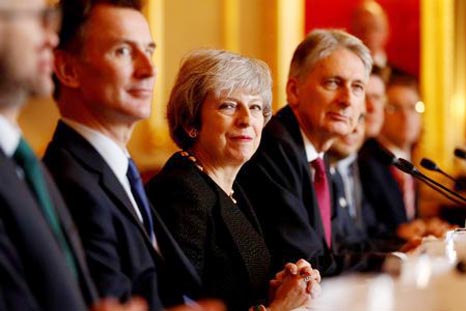
Reuters, London :
A majority of Prime Minister Theresa May’s Conservative Party members oppose her Brexit deal with the European Union, according to a survey published on Friday.
With less than three months until Britain leaves the bloc, May is yet to win parliament’s backing for her deal and the research may dent hopes that pressure from local members over Christmas might persuade Conservative lawmakers to support it.
May postponed a planned December vote on her deal in parliament after admitting it was set to be defeated and is seeking further assurances from EU leaders ahead of a vote now due to take place the week beginning Jan. 14.
The survey of 1,215 Conservative Party members found 59 percent opposed May’s deal, with 38 percent in favor. More than half of members questioned said they did not believe it respected the result of the 2016 Brexit referendum.
Asked how they would vote if another referendum were held to choose between May’s deal or leaving without a deal, just 29 percent said they would pick May’s agreement, compared to 64 percent who would opt for no deal.
The survey was conducted Dec. 17-22 by YouGov for the Party Members Project, a three-year study of membership of the six largest British parties funded by a non-departmental public body, the Economic and Social Research Council (ESRC).
“Grassroots Tories are even less impressed than Tory Members of Parliament (MPs),” said Tim Bale, Professor of Politics at Queen Mary University of London, who helps run the Party Members project.
“If some of those MPs can be persuaded to back the Prime Minister’s deal, it won’t be because they’ve come under pressure to do so from their local party members over the Christmas break.”
May is seeking assurances from the EU over the so-called Irish backstop, an insurance policy to avoid a hard border between the British province and EU-member Ireland, which remains the main obstacle to securing the backing of parliament.
The backstop has cost her the support of dozens of her own lawmakers and the small Northern Irish party that props up her minority government, with critics fearing it could leave Britain indefinitely trapped in the EU’s customs union.
Only 11 percent of Conservative members thought the backstop made sense and should be part of the Brexit deal. Although 23 percent thought it was a bad idea but a price worth paying to secure a deal, 40 percent said Britain should reject any deal that included the backstop..
Meanwhile, the Northern Irish party that props up Prime Minister Theresa May’s government said on Friday that it would not support her Brexit deal but that businesses should be relaxed about leaving the EU without an agreement.
“In fact we’re more alarmed about what is coming out from the EU and especially the Irish government,” the Democratic Unionist Party’s Sammy Wilson said when asked if he was reassured by signals from Brussels.
May still hopes to get her deal through parliament, though even members of her own cabinet admit privately that to do so she will need to make significant changes and win over lots of opposition lawmakers.
If the lower house of the British parliament does not approve May’s deal then the world’s fifth-largest economy will leave the EU without one on March 29 at 2300 GMT as the date is set in law – the 2018 Withdrawal Act.
The Northern Irish DUP, whose 10 lawmakers have propped up May’s minority government, has demanded she ditch the Irish backstop, something the EU and May have ruled out.
The DUP’s Wilson told BBC radio that the Irish backstop was a “con trick” and added that farmers and businesses should be totally relaxed about a no-deal Brexit.
“If anyone should be worried about the tariffs on beef and sheep then it should be the Irish because of course, we, the United Kingdom are net importers of food,” Wilson said.
Facing the defeat of her deal last month, May postponed a parliamentary vote on it, pledging to seek “legal and political assurances” from the EU.
Those efforts appear so far to be in vain. The EU said it will not reopen the negotiation though it signaled it might offer some concessions.
May needs 318 votes to get a deal through parliament yet 117 of her 317 lawmakers voted against her in a confidence vote on Dec. 12.
So she will need the support of some of the Labour Party’s 257 lawmakers or to win over swathes of her own party and the DUP.

